Actress Lola Kirke talks about her new noir thriller, which is set in Los Angeles; in The Actors' Gang's "The New Colossus," the audience votes on which characters should be allowed to stay in the U.S.; The Weinstein Co. releases employees from the non-disclosure agreements that kept them silent.
'The New Colossus' forces the audience to confront feelings about immigrants
Give me your tired. Your poor. Your huddled masses yearning to breathe free.
Those are a few of the famous lines inscribed at the base of the Statue of Liberty. They're from the late 19th Century poem called “The New Colossus,” written by Emma Lazarus. The sonnet has long been associated with an American spirit of welcoming immigrants from around the world with open arms.
Now, a new play — also called “The New Colossus” — by the Actors' Gang in Culver City forces audience members to ask themselves if that welcome mat still lays at our country’s front doorstep.
Who belongs in our country? Who does not? A heartfelt plea from the actor’s on-stage is offered to the audience to help answer these two big questions.
In the Actors' Gang production, a 12-person cast tells the true stories of family members or friends who struggled to come to America. In essence, they perform as their loved ones, in their native languages.
Towards the end of the show, each actor makes their best case to gain entry into this country. And then, the audience more or less votes. Mostly, the actors say, people shout out Yes! But actress Paulette Zubata recalls the night someone yelled No! after she performed as her mother’s friend.
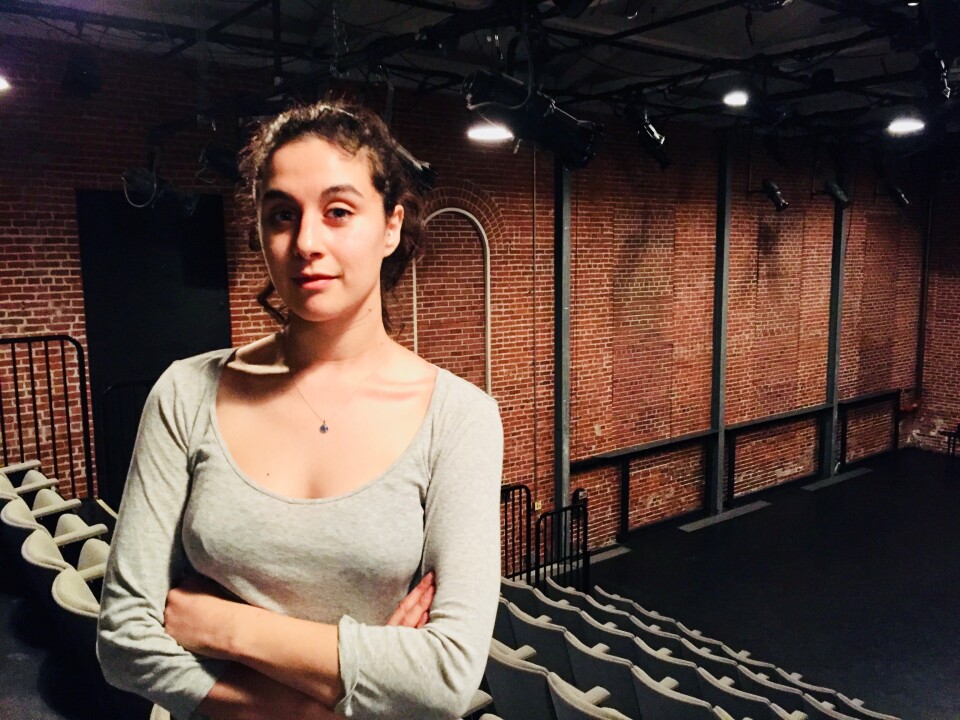
“The no,” sighs Zubata. “It was everything you fear. Everything I feared. Because [my character is] simply asking to please be let in. And to hear that no was powerful, for me as actor, to hear the truth of how statistically that goes. And when I hear the yes, it’s still unbelievable because I know statistically there’s not that many people that get it that easily. It’s not just a simple yes, it’s 10 long years of waiting and hoping and praying that you’ll be let in. Sometimes it’s a no.”
Actor Onur Alpsen emigrated to the U.S. a few years ago from a small town in Turkey. He came here to chase his Hollywood dream. He fell in love with stories as a boy and now hopes to make a living here as a performer and storyteller.
One story that inspired him to become and artist and an immigrant is actually a children’s story from Turkey. It’s one of the classic "Tales of the Hodja" — a Turkish trickster. Alpsen’s grandfather would tell it to him. It’s about a little boy doing something unexpected.
“It’s in a small town. And Nasreddin Hodja is right next to a lake. And the people in the town see him putting yogurt into the lake,” Alpsen says. “What are you doing? You are wasting the yogurt! What is the purpose of this?’ He says, ‘I’m trying to make yogurt out of this lake. They say, ‘It doesn’t make sense, it’s a huge lake!’ And he says, ‘What if? What if! Ya tutarsa!’”
Alspen says the elders back home in Turkey like telling children stories like this because it offers glimmers of hope and new ways of looking at tough, inexplicable events in life. Alpsen points out that the Turkish government has been harassing artists and academics for years. When he was attending college, he started to reach a breaking point where he realized he might have to leave his homeland if he was ever going to become a professional artist.
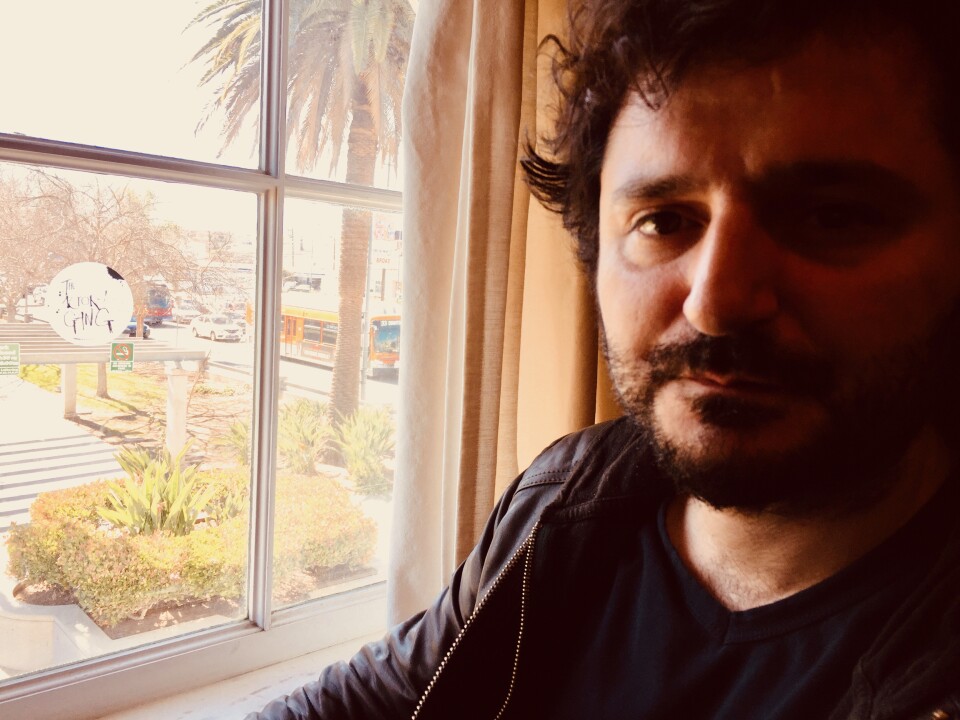
“It was in university the first time I was thinking about going out from Turkey,” Alpsen recalls. “We were doing ‘Blood Wedding’ by Federico García Lorca. A couple weeks later when we were memorizing our lines, the script came from the university [and] they censored a lot of sentences. And words that you can’t use. I decided to go to another place where I can speak and act freely without thinking about [what] the authorities are going to say.”
In “A New Colossus,” Alpsen’s character is a mix of people. It’s a composite portrait of himself and a few friends back in Turkey.
“The main character is my friend, Mehmet Fatih Tras. A couple weeks before the opening of the workshop production last year, he killed himself,” Alpsen says. “Because he signed a petition. It’s called Academics For Peace. Basically, academics saying that we are not going to be part of this crime that government is doing right now in Southeast Turkey against Kurdish people.”
Director and Actors' Gang founder Tim Robbins explains that this play is a working document of sorts. A devised work that allows for change and where the art comes from the actors.
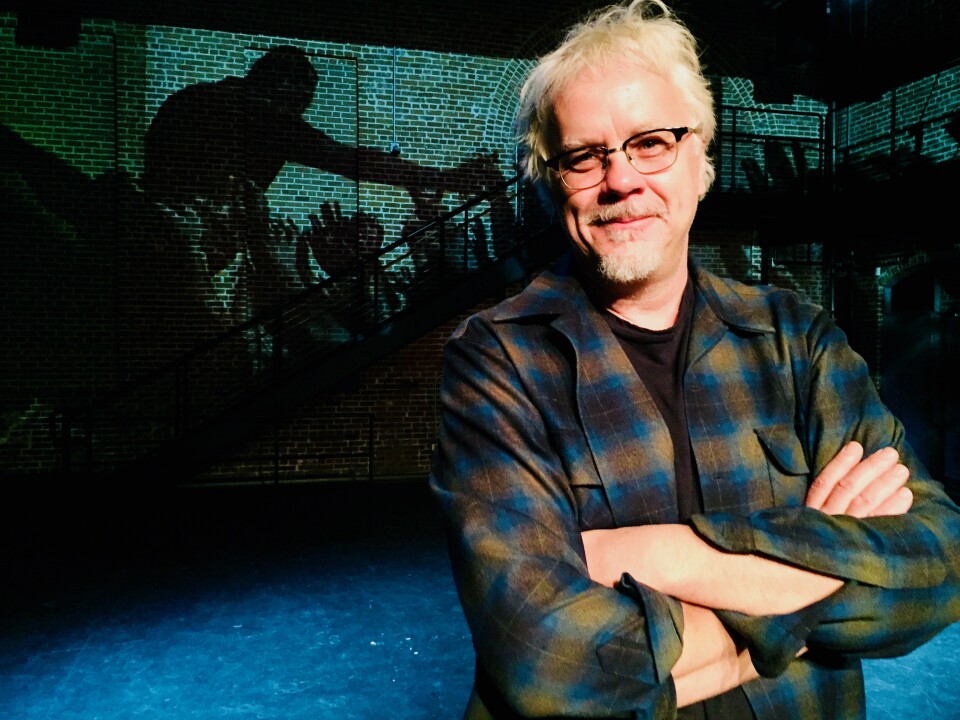
“That’s the story of now,” Robbins says. “That’s the story of refugees right now. The story of society that is right now falling into a dictatorship and it’s a story that’s repeated throughout the 20th Century and it’s happening again. So, it was a story that needed to be told again now.”
At the end of each performance, Robbins usually leads audience members through a conversation about their own coming-to-America histories. The idea is to get a sense of who we are in this country and where we came from.
When students from the Whitney Young Continuation High School in South L.A. attended a recent performance, they voted to let in the immigrants.
“A lot of our students are from immigrant backgrounds so they can connect to this as well," says English teacher Mia Harris. "And then they see what’s going on in the world today with immigration.”
Harris has been working with the Actors' Gang for four years through the theater’s education program. Actors come to her campus to teach performance and storytelling, and then students see shows like “The New Colossus.”
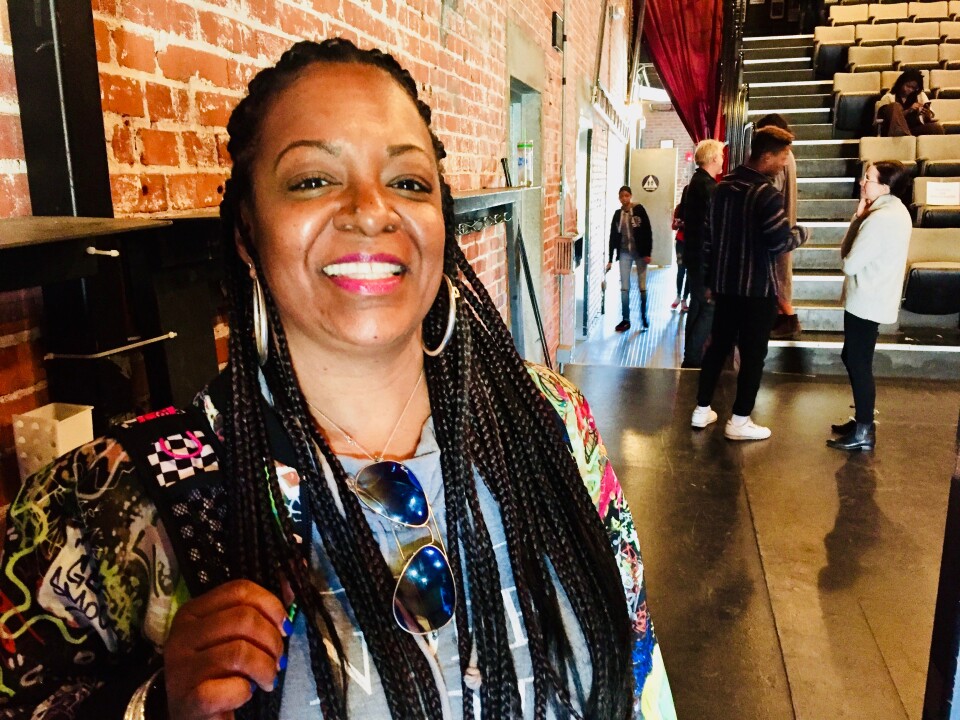
“When you go back back, obviously my roots are from Africa," Harris says. "But this makes me think about how my people were brought here from another country. Even though it didn’t affect me per se, still, it’s in my background.”
That’s the goal of this play in many ways. To get all of us to take a deeper dive into our own histories — the sad parts, the proud parts and even the embarrassing parts.
Actress Kayla Blake grew up in the Bay Area with her family. In the show, she plays her mom, Anna Woo. When Blake thinks about something the show taught her, she recalls eating lunch with her Cantonese-speaking grandparents.
“When I was little we would go to McDonald’s," Blake recalls. "My grandfather would always order a fish sandwich, my grandmother would order a Big Mac. And each would order a cup of coffee.
“They always asked for a McDonald’s bag. After we were done eating, they’d take, like, 50 napkins and put those in the bag — whatever they could grab and stick inside the bag along with the box that the burger came in. And it was so embarrassing! I would tell my mom how embarrassing it was.
“Then sometimes, we would go to a seafood restaurant. My grandmother had a wicker bag. And when the waiter wasn’t looking she would take the bread! I would turn around and talk to my cousins and then it would be gone! I’d have to ask the waiter for more bread.”
Though she was embarrassed as a kid, now as an adult artist telling the story of her family’s migration, Blake says she understands.
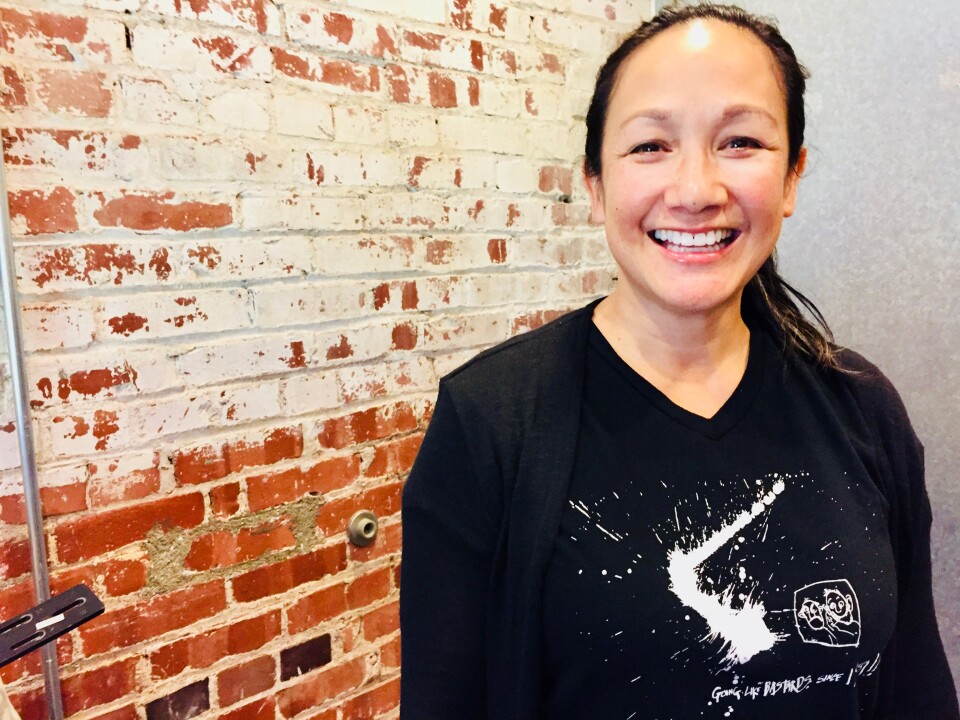
“They don’t take anything for granted,” she says. “Even though when they were older we had a comfortable life, they had a nice home, but still, we were using napkins at dinner that came from McDonald’s.”
Anna Woo, Kayla’s mom, was the 11th of 12 kids. Woo came down to L.A. to catch her daughter portray her onstage. When Woo was a young girl growing up in Malaysia, her large family survived by traveling around Asia performing in a vaudeville act. In those days, Woo did backbends, puppetry, and magic tricks with swords.
“To see [Kayla] talk about that story brings back a great deal of fond memories,” Woo says.
And, of course, some sad memories too:
“During WW2, when Japan occupied that area, we were forced to go into hiding away from the main town where they were bombing Malaysia pretty badly.
“We suffered a lot. There was a lot of starvation. There was no food, we had to eat what we could find. Water was from the river, from the salt water. My brother told me our pet was a dog. We had to eat him, unfortunately. We had no choice. We had some chickens, but if the Japanese saw them, they would take them away. [We'd eat] fish, whatever we could get in the water — sometimes a turtle, even snakes. These were rough times.”
Finally, in the early '50s, the family was able to find their way to America to start again.
“We came from Singapore to San Pedro," Woo recalls. "We took a cargo ship. It took a month. But we finally made it. When we got to the states it was late at night. I remember the ship going into the harbor and I saw lights and lights and lights and lights. Just very happy. Very happy.”
“Every 4th of July, I’m so grateful to be here. I’m grateful to my parents, my grandparents. My voice is quivering because I can’t tell you how grateful I am that we are here. Now, I’m so proud of Kayla because before she started this project, her Cantonese was not that good. But she improved immensely!”
In each of the stories portrayed onstage, a common, familiar note gets struck: It’s not easy to get to America — for anyone at anytime. But that doesn’t mean it’s not worth trying.
For Onur Alspen, he says he was just lucky to have a Turkish grandfather who told him a tall tale once upon a time that taught him something unexpected and special.
Alpsen says: “That story, it made me think [that] nothing is impossible. Just give it a try. Don’t think about the result, but just go for it. It gave me hope about things I [thought were] not going to happen. If I didn’t think this way, I wouldn’t come to Los Angeles and I wouldn’t find this beautiful theater family. In my case, the lake became a yogurt.”
“The New Colossus” is at the Actors' Gang in Culver City through March 24, and then continuing on Saturdays only through May 12.
The Weinstein Co. is ending NDAs, but not everyone is free to tell their stories
When The Weinstein Company announced it had filed for bankruptcy this week, the news was somewhat expected. The movie studio has been in a tailspin ever since allegations of sexual harassment and assault brought down the company’s co-founder, Harvey Weinstein. And a recent bid to sell the company fell through.
What came as more of a surprise was the company’s statement that it is releasing all its employees from non-disclosure agreements — or NDAs — effective immediately.
The Frame host John Horn spoke with lawyer Debra Katz about the possible implications of this decision. Katz is a partner in a law firm that represents plaintiffs in sexual harassment cases. She represents Irwin Reiter, a current senior executive at The Weinstein Company who, until now, was bound by an NDA he’d signed with the company.
What's the purpose of a non-disclosure agreement or NDA?
There are two types of agreements that people are referring to broadly as NDAs. In the Weinstein case, for example, many people as a condition of employment were required to sign NDAs, meaning they would never talk about anything that occurred at the company upon penalty of being fired. So that, to me, is a pretty illegitimate form of an NDA. The Trump Organization uses it, many companies that are just more concerned about [the company's] reputation than the rights of their employees do that.
Then there's an NDA as a condition of settlement, which is fairly common and my clients do it all the time. [It's] where the company says, We're buying peace. And if we settle with you and pay you in settlement of your sexual harassment or any other kind of claim, you will agree not to disparage the company and not to disclose the terms and conditions of the settlement. So those are two very different kinds of NDAs.
In the case of Harvey Weinstein, as the company said in its own statement ending NDAs for employees: "It has been reported that Harvey Weinstein used non-disclosure agreements as a secret weapon to silence his accusers.” Is that the effect these agreements had in the case of The Weinstein Company?
Yes, and that's exactly why [Harvey Weinstein] had those NDAs in effect — to silence people and to chill speech and to make people fearful of coming forward. It is an oppressive tool of people like Harvey Weinstein who want to maintain ultimate control to silence employees.
So when The Weinstein Company says that it “expressly releases any confidentiality provision to the extent it has prevented individuals who suffered or witnessed any form of sexual misconduct by Harvey Weinstein from telling their stories,” what does that mean exactly? What happens next?
It means that people who have been fearful of coming forward because they were afraid of being sued can now tell their stories, write their books, give interviews ... without fear of any kind of legal proceeding or breach of contract action being brought against them. Now, as a practical matter, many people in the aftermath of so many people coming forward just said, I'm breaching my NDA. Like Zelda Perkins [Weinstein's former assistant] in England. But there are many other people who have not, and we may hear many more people's stories. Probably not the actresses, many of whom have come forward and weren't under NDAs. But when it comes to the employees who were bound by NDAs who have long suffered, we're probably going to hear some very gruesome stories.
Is anyone left out by this lift on NDAs?
An interesting question here is that Harvey Weinstein entered into private NDAs where he settled privately with individuals. Those aren't agreements with The Weinstein Company. And the question is whether The Weinstein Company could possibly release them from the private deals that Harvey Weinstein struck, and the answer is probably no on that. But as for The Weinstein Company employees who signed these NDAs as a condition of working there, everyone's free now to tell their stories.
What does The Weinstein Company's bankruptcy filing mean for sexual harassment lawsuits currently pending against the company? Are they put on pause as the company goes through bankruptcy proceedings?
Yes, an automatic stay would be instituted and individuals with sexual harassment cases would have to seek leave from the court ... to have their cases adjudicated. Now, as you know, most of the people who brought lawsuits against The Weinstein Company also brought the same claims against individual board members. And the stay for bankruptcy that would apply and protect The Weinstein Company from litigation would not protect the board members and the individuals. So they will be able to proceed with their claims.
Might it be possible that other companies could look at what The Weinstein Company is doing now with NDAs and follow suit?
I hope so. And you see a lot of legislative action in this regard. A number of states are actually considering legislation to prohibit them altogether. Florida, New York and other jurisdictions think that they're very bad public policy. So I do think that there will be efforts to limit them. And I think companies who see how this is playing out and how corrosive this is in terms of creating an environment where people are too scared to speak, they may think twice about asking employees to do it.




